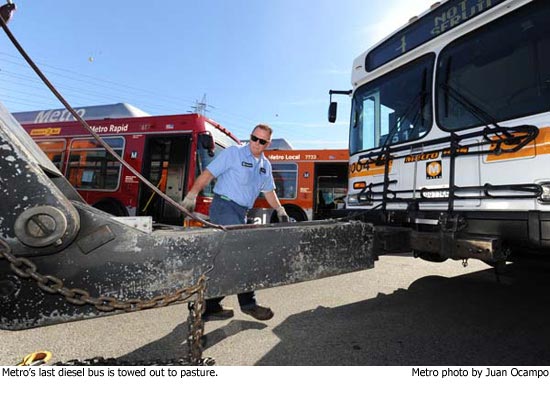Shed no tears for the last diesel bus
January 13, 2011
As Metro retired the last of its smog-belching diesel buses this week, the agency marked the occasion with all the hoopla befitting the end of an era. There was a press conference highlighting Metro’s now 100% clean-burning bus fleet, and an unceremonious towing-away of the last diesel dinosaur.
At the same time, the agency’s library took a moment to look back at a very different Los Angeles, when the first diesel buses made their appearance here in 1940.
At the time, the coming of those initial 72 buses was hailed as a breakthrough in speed and comfort.
“These coaches offer a new degree of smooth acceleration with no vibration or uneven motion,” according to a trade publication quoted in the library account. “Attractive interiors boast mohair upholstered seats, stainless steel fittings, spacious aisles and wide windows.”
But things were about to get a lot more uncomfortable for the breathing public in the City of Angels. And vehicle exhaust—from cars and those ballyhooed buses—eventually would prove to be a major culprit.
“The dawn of diesel didn’t bode well for Los Angeles,” the library’s article said. “Just a couple of years later, Angelenos began noticing something else around town besides their new fleet of buses with mohair upholstery. On July 26, 1943, L.A. suffered through its first day of ‘smog.’ ”
The article includes this link to historic photos from the UCLA Library documenting some of the worst moments of the smog era in Los Angeles.
With the departure of the last diesel bus, Metro becomes the only major U.S. transit agency with a bus fleet made up entirely of clean-burning alternative-fuel vehicles.
As recently as 1984, the agency’s fleet had included more than 3,300 diesel buses. Its transition away from diesel started in 1993, when Metro’s Board of Directors decided to start buying only alternative fuel clean air buses.
Today, the agency has 2,221 compressed natural gas buses, six gasoline-electric hybrids and one electric bus. The switch to natural gas has meant a drop in greenhouse gas emissions of nearly 300,000 pounds a day, compared to what would be emitted by diesel buses, the agency said.
Metro’s blog The Source, meanwhile, has the lowdown on the fate that awaits Old Number 3004.

Posted 1/13/11













 405 bridge work causes a stink
405 bridge work causes a stink

